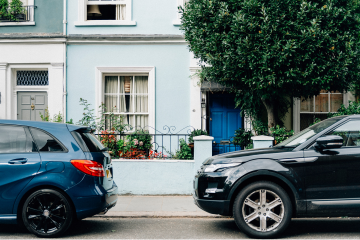Being without a car can make all your plans grind to a halt. So if your car gets stolen or written off, you'll want to have a backup plan.
Vehicle replacement insurance, or 'new for old insurance', can provide you with a replacement if your car gets stolen or written off.
We'll go through how vehicle replacement insurance works, who's eligible, and what scenarios it can cover.
We'll even take a look at the alternatives. Read on!

What is vehicle replacement insurance?
Vehicle replacement insurance is designed to cover the cost of replacing your car with another of the same make, model, and specification if it's written off or stolen.
Otherwise known as 'new for old insurance,' it usually only applies to cars that are 12 months old or less.
So how does it work?
If you write off your car, or it's stolen, and you have vehcile replacement insurance in place, your insurer should offer you a brand new replacement.
If your insurer can't find a suitable car, it might offer you a cash settlement instead. This is usually the value of your car brand new.
Some comprehensive car insurance policies offer new for old insurance as standard, but others only offer it as an add-on. If this is the case for you, you'll need to pay extra to bolt it on to your car insurance.
To see if your insurance includes it, check your policy documents. Or, contact your car insurance provider.
Compare car insurance quotes
What happens if I don’t have vehicle replacement cover?
Without vehicle replacement cover, your insurance would only pay out the current market value of your car at the time of the incident. This is your car's average selling price based on the market.
Often this is a lot less than what you paid originally, as new cars lose value fast.
If you wanted to buy a brand new car to replace your old one, you'd need to pay the difference yourself.
What happens if I don’t have vehicle replacement cover?
To be eligible for a vehicle replacement cover, your car normally needs to meet certain conditions.
These usually include that:
- You should have only owned the car for 12 months or less.
- You're the registered owner of the insured car, and have bought it outright. Or, if you bought the insured car under a hire purchase agreement, the hire purchase company must agree to the terms of the policy.
- You must be the first registered keeper of the vehicle. Sometimes insurers will allow you to be the second registered keeper of the car. But only if your car's pre-registered in the name of the manufacturer or dealer you bought it from. And the mileage was under a certain amount before you bought it.
What scenarios can it cover?
Though it can vary from insurer to insurers, you'll normally only be covered if:
- If your car's involved in an accident and the cost to repair it is higher than 50 to 60% of the vehicle's price when you bought it. This percentage varies between insurers.
- If your car gets stolen and isn't recovered.
You won't normally be covered if:
- Your car was stolen or damaged due to negligence. This is when you put your vehicle at risk, for example if you leave the car unlocked or unattended with the engine running.
-
Your car breaks down due to wear and tear. You also won't be covered for mechanical breakdown, this is where a car warranty might help.
- The cost to repair the car after an accident is higher than 50 to 60% of it's price when you bought it. In this case your insurer will usually pay for repairs and replace the damaged parts instead.
How can I get vehicle replacement insurance?
Vehicle replacement insurance comes as standard with many policies, so check your documents.
If you find that it isn't included, contact your insurer and ask them to add it to your policy.
Are there any alternatives I should think about?
GAP insurance:
You might want to consider GAP insurance as an alternative to vehicle replacement insurance.
Guaranteed asset protection (GAP) insurance policies are designed to provide enough funds for a replacement car. They can also clear any outstanding debt if you bought the car on finance.
GAP insurance makes up the difference between what an insurance company offers you if the car gets stolen or written off (its current market value). And what you paid for the car originally, or how much finance you still owe.
We don't currently compare quotes for GAP insurance. But you may be able to get it direct from your insurer.
Agreed value insurance:
You may also want to think about agreed value insurance. With this type of policy you can set the value of your car with your insurer. If your car's a total loss, your insurer should pay you the agreed amount regardless of its market value.
Agreed value insurance is often a suitable option for people who have an unusual or a classic car. It can also be a good choice for specialist or modified cars. These cars are usually worth more than others of the same make, model, and age.
You'll have to prove the car's value to your insurer. Usually by taking photos or providing invoices. In some cases you might even need a professional valuation.
Because agreed value insurance is less common, they can be more difficult to find. They can also be more expensive than other car insurance policies.







